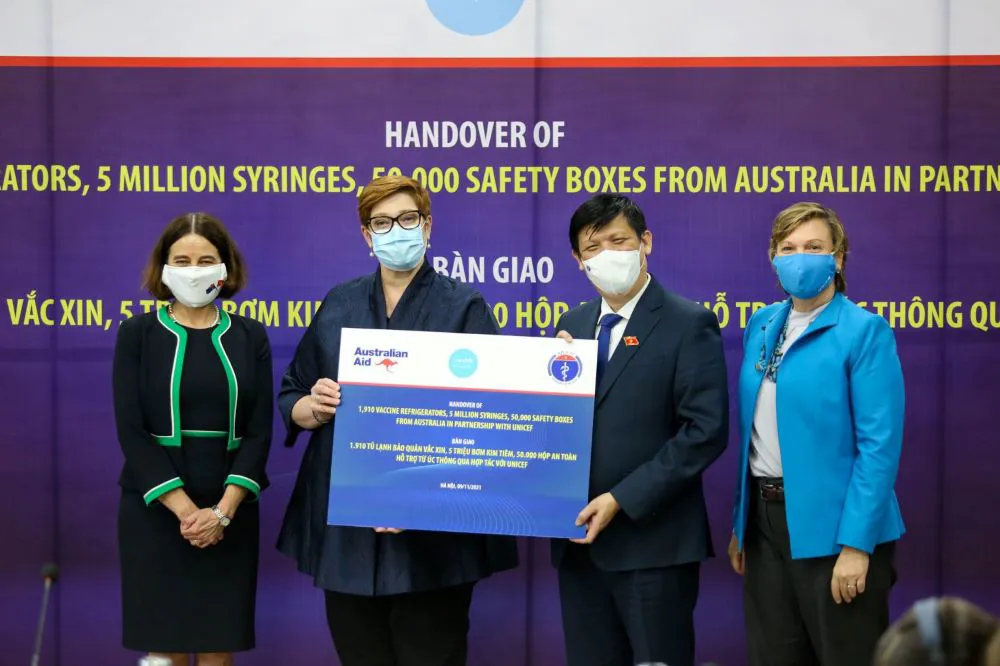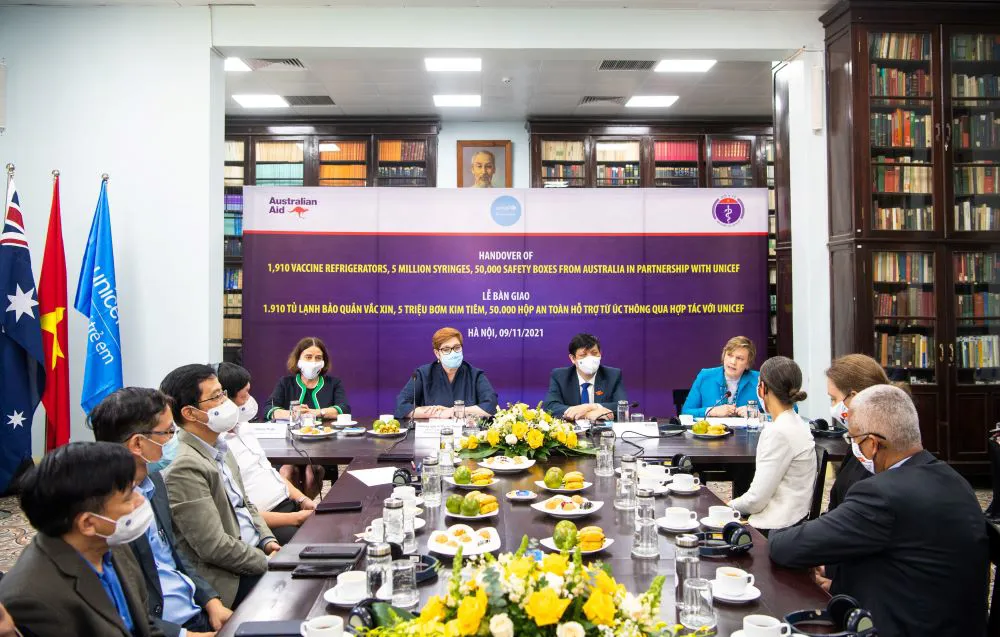Australia intensifies Covid relief to Vietnam
The latest support is part of Australia’s AUD60 million (US$44 million)-supporting package for Vietnam’s Covid-19 vaccine rollout.
The delivery of 1,910 refrigerators, 5,000,000 syringes and 50,000 safety boxes under the Australia-UNICEF partnership on vaccination assistance marks the latest donations of the Australian government’s Covid relief to Vietnam.
The announcement was made during the visit to Hanoi paid by Marise Payne, Australia’s Minister for Foreign Affairs and Minister for Women.
| From left: Australian Ambassador to Vietnam Robyn Mudie, Australia’s Minister for Foreign Affairs and Minister for Women Marise Payne, Vietnam's Health Minister Nguyen Thanh Long, UNICEF Representative in Vietnam Rana Flowers. Photos: UNICEF |
At the symbolic handover ceremony held in Hanoi on November 9, Payne also announced that Australia will share an additional 2.7 million Covid-19 vaccine doses with Vietnam. This raises Australia’s contribution to its strategic partner to more than 7.8 million doses and is part of this country’s commitment to share at least 60 million doses with the Indo-Pacific region by the end of 2022.
Addressing the ceremony, Marise Payne said “I’m very proud that Australia is working in partnership with the Government of Vietnam to help to support Vietnam’s Covid-19 vaccine rollout.”
“As a close friend and partner of Vietnam, Australia is very proud to be able to support Vietnam in this way. It is indeed, only together that we will be able to maintain progress toward our region’s shared recovery from Covid-19 and to overcome the pandemic.”
Speaking at the event, Vietnamese Minister of Health Nguyen Thanh Long appreciated the much-needed support of the Australian Government and UNICEF in the protection of people’s health, especially in the prevention of Covid-19.
The syringes and safety boxes are being distributed to vaccination points while 1,910 vaccine refrigerators HBC-80 will be delivered to hardly accessible communes in 35 provinces that currently lack refrigerators.
With a storage capacity of 61L, the refrigerators will each be able to store enough vaccines doses for targeted Covid-19 vaccination in the communes.
Rana Flowers, UNICEF Representative in Vietnam, said “UNICEF is delighted to join hands with the Australian Government to support Vietnam to enhance the capacity of the health and immunization systems to efficiently and equitably distribute Covid-19 vaccines.”
The cold chain equipment ensures that the vaccines are safely stored and delivered, crucially contributing to strengthening immunization systems right down to the commune level. Therefore, it ensures that people even in the remotest areas have access to safe vaccines, including those for Covid-19.
“Equitable access to vaccination is the clearest pathway out of the pandemic, is the pathway to ending preventable deaths. No one is safe until everyone is safe,” Rana Flowers noted.
Announced in April 2021, the Australia-UNICEF partnership provides a unique package that will assist Vietnam across a range of areas vital to the successful delivery of a mass immunization program against Covid-19.
Along with upgrades to cold chain equipment and the purchase of immunization devices, the partnership supports training for healthcare workers, communication campaigns, monitoring of vaccine deployment, and planning and implementation of the vaccine rollout in remote provinces in Vietnam.
The partnership is part of Australia’s comprehensive AUD60 million (US$44 million)-supporting package for Vietnam’s Covid-19 vaccine rollout.
| Rana Flowers, UNICEF Representative in Vietnam, speaks at the event. |
Canberra's regional focus
Vietnam is one of the destinations including Malaysia, Indonesia, and Cambodia – the incoming ASEAN Chair, in Payne’s Southeast Asia tour starting this week.
Her visit to Vietnam “takes place against the backdrop of the Australia-Vietnam Enhanced Economic Engagement Strategy, which was launched last week by our countries’ Prime Ministers,” Marise Payne said before the trip.
According to Huong Le Thu, Senior Analyst at the Australian Strategic Policy Institute, despite differences in political systems and certain values, Canberra and Hanoi are increasingly more aligned in strategic priorities and like-minded in many ways.
Both Vietnam and Australia have dealt with the Covid-19 pandemic relatively well, giving the countries sufficient bandwidth to think strategically. An indication of that was Australia’s release of Defence Strategic Update 2020 where it espoused a view on the rapidly changing global order and expressed the activeness it needed to shoulder in order to protect sustaining the rules-based order.
Vietnam, as the Chair of ASEAN in the pandemic year, and the UN Security Council’s non-permanent member, played an active role in international affairs beyond the focus on domestic politics and containment of the outbreak at home.
Meanwhile, Payne’s Southeast Asian trip follows last month’s historic leader-level agreement to establish a Comprehensive Strategic Partnership between ASEAN and Australia, which underscores Australia’s commitment to ASEAN’s central role in the Indo-Pacific.
She stressed that “ASEAN centrality is at the heart of Australia’s vision for the Indo-Pacific.”
During the trip, Australia announced its financial support for two new climate investments that will raise up to AUD500 million ($368 million) to support countries in Southeast Asia to adapt to climate change through better management of forests, land, and agriculture.
These investments form part of the Morrison Government's recent decision to increase its climate finance to AUD2 billion through 2025 to support mitigation and adaptation efforts in the region.
The investments leverage the Australian Government's development assistance to mobilize much larger levels of private sector investment into the region.



![[Vietnam – reliable partner] Australia: Strong supporter of Vietnam's growing engagement on int'l agenda](https://cdn-media.hanoitimes.vn/2021/10/30/cover.jpg?w=480&h=320&q=100)









